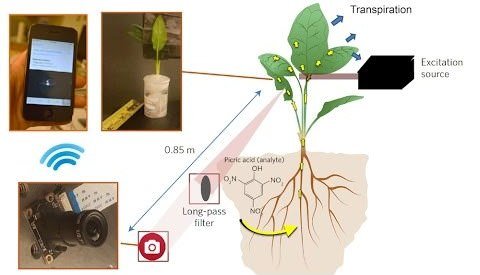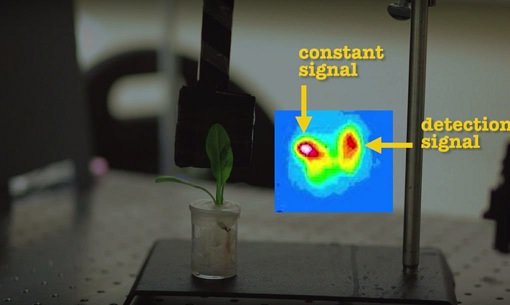Before now, Spinach has been seen as a mere vegetable, probably for cooking and all that. But I guess after reading through this survey, you would have to look at spinach differently; maybe with respect :).
The term "bionic plant" is not entirely new to this era. At least we have seen the bionic plant that glows in the dark; which could potentially be used to illuminate our homes and streets naturally. Another advancement has been blazed in the plant world, and this advancement has even gotten better. I present to us the plant (Spinach) that can analyze and detect explosives. Are you surprised by this? If you are; may I humbly remind you that technology is already merging with biology.

Engineering the plant [Plant nanobiotics]
Leveraging on the fact that we already have a prior knowledge that the term "bionic" is no longer an absolute prerogative of humans; I would love to state that this is actually one of the first approaches to incorporate electronic system into an organic plant.
This feat was achieved by a team of researchers from MIT (Massachusetts Institute of Technology); the same team that engineered the fluorescent plant I mentioned earlier; which enabled the incorporation of carbon nanotubes into the leaves of the Spinach plant.
The Carbon nanotube; which also embeds some micro chips; transformed the plant into a wireless sensor. The plant can detect explosive compounds and relays the data wirelessly to a computer device or smart phone.
The main aim of this research on nanobiotics is to prove that electronic devices can be embedded into organic plant.
According to one of the lead researchers of this project:
The introduction of nanoparticles into plants will enable them to have a non-native function. - Professor Michael Strano; Chemical Engineer, MIT [Paraphrased by me]

Mechanics of the Bionic Plant
Plants are very good at analyzing chemical compounds. - Prof Strano
In the case of the bionic spinach, it was engineered to detect and analyze a particular chemical compound which is normally used to produce landmines and some other forms of explosives. This compound is called "Nitroaromatics".
When a landmine that has this compound comes in contact with the ground, the nitroaromatics would get sucked-through by the groundwater. And because the bionic spinach can detect this compound, the incorporated carbon nanotube inside the spinach plant will fluoresce (as a way of giving signal). This fluorescence can be caught by a tiny smart infrared camera which is normally mounted around the plant. This smart camera would send a message to the computer device (usually a raspberry pi) that an explosive has been detected.
Truly, the power embedded in Mother Nature is simply amazing. Imagine when this tech gets fully advanced; it could be farewell to landmines :). This tech would be very handy in this part of the world where it is not uncommon to find explosives.
Monitoring the environment through plant
No doubt, plants are so abundant on earth. What if these plants can also be used to monitor the environment? This is because, plants can take a lot of data from the environment.
Plants are very responsive to the environment. - Prof Strano
One very unique thing about plant is that they can detect some minute changes in their surrounding. It is also worthy to note that {the prototype design for the explosive-detecting spinach was able to just detect the "nitroaromatics" compound, but subsequent advancements have been made to these plants. Now, plants' carbon nanotube can detect Trinitrotoluene (TNT), Hydrogen Peroxide, and even Sarin gas. Thanks to technology.

Futurism of bionic plant
We've seen amazing tweaking to the natural plant, but even more advances are underway.
How would you feel to have plants send signals in real-time directly to your mobile phone in the event of irregularities in the surrounding environment? (Believe me, it would be like plants are communicating with us. And we would achieve that soon).
Also, these could come in handy in the field of meteorology; where plants would be engineered to forecast weather and climate over a particular location, and also to send real-time weather data for the place. Seems fascinating right? Well, that's what emerging technology is all about.
With this trend of technological advancements and evolution, the future could favour technology over biology.
Tech Rules!!
Thanks for reading
References for further reading: Ref1, Ref2, Ref3, Ref4, Ref4


Quite an eye opening research @samminator.
Downvoting a post can decrease pending rewards and make it less visible. Common reasons:
Submit
Thanks a lot bro
Downvoting a post can decrease pending rewards and make it less visible. Common reasons:
Submit
Maybe there are already connected with some type of electronic system unknown to us. With this breakthrough we will be able to get connected easily to them. Advancement in this technology can lead to effective communication between plants and humans. At least now we are able to communicate with other animals but after this we will be able to effectively communicate with plants and understand if they are thinking and what they are thinking. Good article. :)
Downvoting a post can decrease pending rewards and make it less visible. Common reasons:
Submit
Well said. Thanks a lot for dropping by
Downvoting a post can decrease pending rewards and make it less visible. Common reasons:
Submit
Yeah. That was a great scientific research. You must have research extensively to be able to know a particular plant capable of detecting an explosive. Great job. Keep it on
Downvoting a post can decrease pending rewards and make it less visible. Common reasons:
Submit
Lol. Thanks man
Downvoting a post can decrease pending rewards and make it less visible. Common reasons:
Submit
Am loving every bit of this article. It is really an ear opener. Keep it up dear
Downvoting a post can decrease pending rewards and make it less visible. Common reasons:
Submit
Thanks a lot
Downvoting a post can decrease pending rewards and make it less visible. Common reasons:
Submit
good inf follow now
Downvoting a post can decrease pending rewards and make it less visible. Common reasons:
Submit
Thanks
Downvoting a post can decrease pending rewards and make it less visible. Common reasons:
Submit
Nice update
Downvoting a post can decrease pending rewards and make it less visible. Common reasons:
Submit
Thanks
Downvoting a post can decrease pending rewards and make it less visible. Common reasons:
Submit
Good research, thumbs up
Downvoting a post can decrease pending rewards and make it less visible. Common reasons:
Submit
Thanks a lot
Downvoting a post can decrease pending rewards and make it less visible. Common reasons:
Submit
This is one of those moment's where nanotech is a lil better than you thought....but not, and also a need to re-read tomorrow...
Great post and thanks for sharing it.
This is a very interesting topic, ....Bio-Home Security...LOL, how good is mint.
We as a species have so far to go....
Downvoting a post can decrease pending rewards and make it less visible. Common reasons:
Submit
Thanks a lot for the kind comment
Downvoting a post can decrease pending rewards and make it less visible. Common reasons:
Submit
Wow plant fa.
Thanks for the info bro
Downvoting a post can decrease pending rewards and make it less visible. Common reasons:
Submit
Nwanne daalu rienne :)
Downvoting a post can decrease pending rewards and make it less visible. Common reasons:
Submit